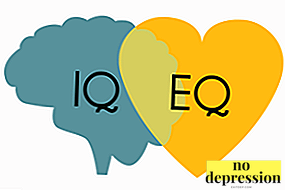Life in society involves not only understanding yourself, but also the people around you.
The ability to recognize emotions, feelings and reactions people are called emotional intelligence.
Like mental, it can be developed and trained.
Concept of EQ

Psychologists say that man is driven by two forces: emotions and mind.
Often, emotional experiences are so strong that they overshadow the thoughts of the mind.
The ability to manage your own feelings, understand them and use them in a positive way is emotional intelligence - EQ.
This also includes stopping destructive emotions, coping with stressful situations and the ability to find motivation for action.
However, the concept of EQ includes interaction with other people. So, understanding the decisions of other people, awareness of the essence of relationships with them and the ability to use their own feelings when contacting the world is the basis of developed emotional intelligence.
Intellectual emotions
Any mental activity of a person provokes in his mind appropriate reaction. There is no solution that would not cause the emotional coloring of the situation in a person.
Intellectual emotions are human experiences that arise in the process of thinking, analyzing the situation and finding the right solution.
Intellectual emotions born in the process of any cognitive activity. Information received from outside causes an instant reaction of consciousness. A person experiences surprise, amazement, a sense of novelty, etc.

For example, the feeling of surprise that occurs after hearing information.
After receiving the information, the consciousness immediately begins finding a rational explanation for this situation.
The desire to solve the proposed riddle is emotion.
Not rarely a person's feelings are confused. He finds several acceptable solutions and is faced with a choice. Most often, such a complex process is completed. confidence in your own decision.
Intellectual emotions can be compared with more practical feelings of a person. "Extraction" solutions in a difficult situation, the individual is given the same pleasure as physical activity, for example, food extraction.
Negative emotions have the same effect. In a confusing situation, a person experiences anger, frustration, frustration, just like in the case of physical loss.
The ability to restrain their own negative reactions, the desire to predict the outcome of actions and the management of emotions distinguishes man from animals.
What does intelligence consist of: structure and components

In the late 1930s, scientists advanced the theory that a person has not only logical and mathematical intelligence (IQ), but also other models of it. 1983 concept "Multiple intelligence" has been studied.
On the basis of the data obtained, seven types of intelligence were identified, among which was emotional, also interpersonal, EQ.
The combination of several types of intelligence was later used as the basis for the first model of intelligence. Designed with the participation of David Caruso The theory described the emotional intelligence of a person as the ability to identify one's own emotions.
The ability to analyze the reactions of the people around was also taken into account. Based on his own and others' feelings, a person makes decisions, was listed in the work of Caruso.
Also denoted ability to control your feelings and use them.
Later, the concept of emotional intelligence was refined, with the result that four of its components were highlighted:
- Emotion Recognition (their own and others'), as well as the identification of authentic expressions of feelings. This includes the adequate flow of their own experiences to the society.
- Understanding the source of emotions. The ability to find a causal relationship, the ability to identify the source of emotions, understanding the totality of certain sensations.
- Use of emotions. The ability to apply emotions to achieve goals, the ability to provoke feelings from others.
- Control. The ability to suppress negative experiences, the ability to cope with high-intensity emotional situations.
Test and Diagnosis

As in the case of mental, emotional intelligence has different degrees of development.
To determine the abilities of a particular person apply a series of tests.
The most common technique today was developed Nicholas Hall. The test is suitable for personal assessment, as well as self-testing.
As with the assessment of mental intelligence, the Hall test result will not be a single point. Testing consists of 30 questions, the results of which will be the basis of five characteristics.
Five components of emotional intelligence:
- Awareness of the current emotional state.
- The ability to subjugate your own emotions.
- The ability to provoke an emotional response from others.
- The ability to sense other people's experiences, projecting them onto oneself is empathy.
- The ability to use their own feelings in order to achieve success.
According to the test results, judgment is made about what level of intelligence is peculiar to the test person. For example, a high level says the ability to clearly express their emotions and understanding of their essence.
Some signs of low UI:
- attempts to hide their own feelings;
- inability to take responsibility for their experiences;
- obstinacy and rigidity in communication;
- lack of attention and a constant desire to stay in the center of events;
- pessimism, including projected on others;
- fear of changing one's own convictions.

A huge contribution to the study made Devin Goleman, author of the book "Emotional Intelligence. Why does he mean more than IQ? The book of D. Goulman helps the reader not only to understand the essence of the EI, but also to develop his own abilities.
Ability development
How to increase emotional intelligence?
Emotional intelligence is not a constant. As a person develops, his emotion coefficient also changes.
This ability you can develop yourself. Like emotional intelligence itself, its development consists of five stages.
Evaluation of own emotionality

Self-knowledge plays a key role in the initial stage of personal development.
To understand the state of EI, it is necessary to examine your own ability to react and experience feelings.
According to psychologists, all feelings experienced by a person become foundation for future sensations. That is why it is important to be aware of the roots of the sensations experienced.
Simple words, having understood the reasons for the experienced anger, joy or annoyance, a person acquires the ability to control them.
If the individual survived the situation, but did not understand his feelings, the tested emotions will arise again.
Ways to know yourself:
- Maximum awareness. Focus your mind more often on momentary sensations. “Why do I feel this?”, “What initiated this sensation?”
- Fixing thoughts. Write your thoughts after the difficulties you have overcome. Later analyze what served as an assistant in the decision, and what, on the contrary, prevented.
- View from the outside. Ask your loved ones how they see you. No need to dispute their point of view. Just understand their vision of you.
Self control

The second step in the development of emotional intelligence will be ability to control your own feelings.
This will require a rational evaluation of sensations.
Think about your feelings and line up the most profitable line of conduct. At first, in difficult situations, emotions will prevail, but soon the ability for self-control will increase.
The simple method will help to cope with flashes of own feelings. "Count to ten." Wait 10 seconds before acting, no matter how correct the forthcoming decision may seem.
The ability to sympathize
Sympathy is the ability to feel other people's experiences, as if sharing them with an experienced person. The third step towards the development of the EI will be “Co-feeling” is the so-called empathy.
Strengthen your own ability to empathize will help such tips:
- Listen carefully. Of course, a person is not able to fully experience the experiences of another. However, he can get into the situation as much as possible. It is important to let your opponent speak out, not trying to interrupt and correct him.
Simple exercises will be everyday conversations. Aerobatics can be considered the ability to listen even if you disagree with the opponent.
- Go into opposition. Turn off the trodden path and try to stand in the place of the speaker. Justify him in your own thoughts, trying to understand the motive of his act.
- Understanding, not knowledge. Do not try to "fit" the version of the speaker to your experience. Do not say "I know." It is important to feel the situation and say "I understand."
These three exercises will help learn to co-experience opponent's feelings, not just take them into account.
Motivation search

Psychologists call motivation one of the constituent parts of an emotionally developed personality.
it a kind of rod encouraging a person to solve complex problems in order to obtain benefits and experience.
Constant training of these forces forms a strong personality, able to set goals and achieve them.
Motivational goal there can be any feeling pleasant to an individual. The anticipation of achieving "victory" motivates a person to accomplish. The goal can be a personal life, career growth or sporting achievements.
A motivated person takes on difficult cases without fear of losing. He is driven by certain priorities, so he cannot be led astray.
To train motivation psychologists recommend writing goals on paper. Describe in detail the upcoming event, your role in it and the actions you expect from yourself. This “will become a plan of action” for a specific task.
In this case, we should not expect only victories. Great success certainly consists of successes and failures. The ability to extract useful experience from failure is component of an emotionally developed person.
Socialization
Interaction with others - the contact of the inner worlds of interlocutors. In order for these worlds to speak the same language, it is important to understand the signals that people send to us. These signals are rarely verbal, therefore it is important to be able to “read” them according to the feelings expressed by a person.
The most useful socialization training is resolving disagreements. A person who controls himself in a discussion is capable of the most fruitful interaction.

How to train social skills:
- Resolving conflicts in a pair. The ability to settle a dispute in personal relationships is a prerequisite for harmonious love. Situations where feelings are extremely aggravated, it is important to be able to hear the partner and perceive his point of view.
- Taking time out. In a conflict (for example, at work) it is important to know that both parties understand the reason for the differences. Stop the dispute and offer a compromise. So you will understand what your opponent really wants.
- End the dispute with consent. Even if the opinion is negative, it is important to converge in it. A dispute terminated by a unanimous decision shall be considered completed.
Methods for children
Developed a whole program for the development of emotional intelligence in children. Begin training at preschool age. Country of Emotions Program consists of many lessons. For example, classes dedicated to fear, consist of such blocks:
- Acquaintance of preschool children with basic feelings: fear, joy, etc.
- Understanding fear and stopping it.
- Reducing the sense of fear by exploring the "scary" characters, empathy them with the use of humor.
- Transformation of negative sensations into pleasant ones.
Man's feelings are an enormous force, capable of both creating and destroying. To learn to interact with oneself and others, it is important to understand the nature of one's own feelings and learn how to control them.
How to develop emotional intelligence:



